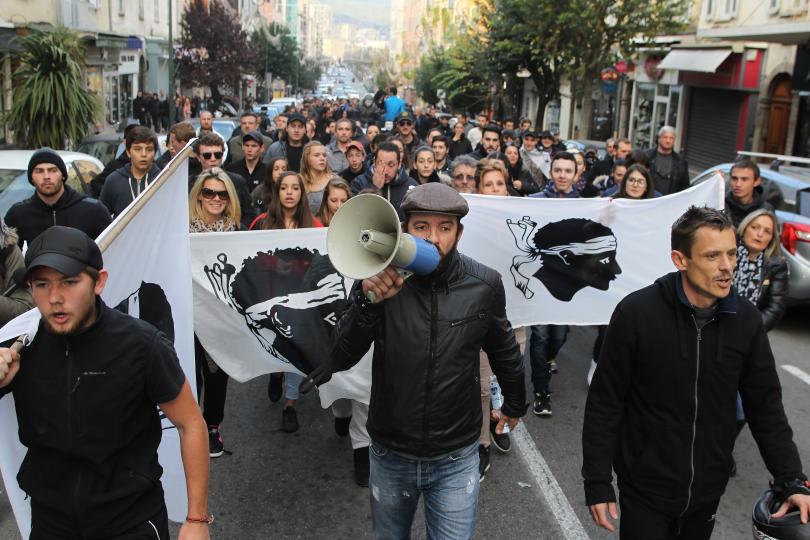Saturday, June 22, 2019
Lombard nationalism: Part IV
Corsican nationalism - A comparative examination
There are many similarities between Lombard nationalism and Corsican nationalism. Both had been clearly-defined cultural and linguistic regions prior to becoming part of other administrative states over time. Being small, they were both subject to falling under the thumb of larger, more powerful nations; France, Spain, Austria, etc. The only notable differences are that Corsica fell under France due to a clear act of military aggression in 1769, the whole of Corsica was under the sovereign Corsican Republic prior to that time, and lastly... that some Corsican nationalists finally resorted to terrorism starting in the 1970s. On the other hand, Lombardy was eased into the Italian state slowly; though the revolutions of the mid-nineteenth century. Also, the collective Lombard cultural-linguistic milieu was never officially part of the same state. Given a twist of fate, Corsica may well have ended up being part of the Italian state as well; Lombardy could well have ended up as part of a liberated Lombardo-Venetia--the former client state of the Austrian Empire--along with perhaps the Trentino region. Both of those possibilities would very likely have served them better than the status quo.
I had been mistakenly led to believe that Corsica was overwhelmingly "ethnic Corsican." Actually, as of 2011, only 56% of the population was even born in Corsica! That means that the Corsicans may well now be a minority in their own ancestral homeland. About 29% were born on the mainland of France (some could be returning Corsicans), and about 15% were born in North Africa. It reminds me of the line by English King Longshanks in the film 'Braveheart' in reference to the Scots: "If we can't get them out, we will breed them out." That's how the Fabian-symbiosis of Monopoly Capitalism and Social Marxism operate; they eliminate a people's identity first. Lombardy has a similar demographic situation; however having had a much larger population to begin with, it has been more difficult to push them out numerically.
Although certain elements within Corsican society are highly passionate about independence and possible nationhood, even moreso than in Lombardy; however, just as with other defeated peoples... most are melancholy when push finally comes to shove. In contrast, support for formal Lombard nationalism might even be greater overall. Still, nobody has ever traded bullets with the state, as has been the case in the Corsican conflict. The two main Corsican nationalist political parties are the left-wing Corsica Libera, and Party of the Corsican Nation. A distinction should be made between Socialist-Nationalists and open-borders Socialists. Socialist-Nationalists are concerned with issues such as nationalism, social welfare, and labor; while open-borders Socialists are concerned with a whole slew of separate issues which International-Capitalists have no real issue with.
While both lingo-cultural regions have legitimate political parties to address their issues and goals, Corsica has the militant National Liberation Front of Corsica. The "FLNC" came out of a number of terrorist groups which started in the 1970s. They bombed infrastructure and symbols of French rule until their proclamation of ending the armed period of their struggle in 2010. The FLNC has however stated that if Muslim extremists commit terrorist acts within Corsica, then they will respond to it. Just in general, the Corsicans have showed their displeasure at the increasing presence of Moroccans and other Muslims much more openly than has been the case in Lombardy. There has been terrorism in Lombardy, however it was due to something entirely different; namely "Operation Gladio," where the deep state committed false-flag terrorism in the name of fake Communist organizations to achieve an end. The "deep state" is an international milieu of well-placed rouge intelligence operatives controlled by Globalist elites to finally achieve their internationalist dream of one-world, one-government, one-race, etc.
I never could understand why Italian-Americans never took--even just a little bit--to the Corsican issue since it was so similar to the circumstance in Ireland. You could go into many Irish-American bars today and see signs on the wall "BRITS OUT OF IRELAND!!" Corsicans speak a dialect of Italian, they're Roman Catholic, and the island has had Etruscan, Greek, Roman, Lombard, and Italian influences throughout its history. It's very similar to Sardinia. It's definitely not "French," despite the fact that French has been installed as the official language. It's more "Southern Italian" in it's culture and sensibilities.
'Globe: Nationalism Comes To Corsica'
'Thousands of Corsicans Demanded Greater Autonomy from France'
'World Directory of Minorities and Indigenous Peoples - Corsicans'
.
Labels:
Corsica,
France,
geopolitics,
Italy,
Lombard nationalism,
Lombardy
Subscribe to:
Post Comments (Atom)



No comments:
Post a Comment